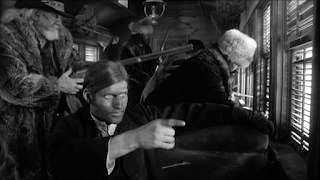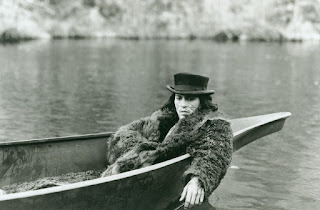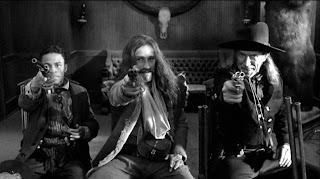A psychedelic Western that deals with existentialism and spirituality
Featured in IMDb Critic Reviews
 |
| Dead Man (1995) - By Jim Jarmusch |
Our Rating: 9.0
IMDb Ratings: 7.7
Genre: Drama | Fantasy | Western
Cast: Johnny Depp, Gary Farmer, Crispin Glover
Country: USA | Germany | Japan
Language: English | Cree
Language: English | Cree
Runtime: 121 min
Color: Black and White
Dead Man is a 1995 Revisionist Western film written and directed by American independent film director Jim
Jarmusch. Dead Man stars Johnny Depp in the lead role of an accountant-turned-outlaw
William Blake. In Dead Man, Jarmusch presents the bizarre journey of a meek, naive young
accountant who, after getting haplessly entangled in a deadly maelstrom, goes
through an intellectual and spiritual transformation that changes his life
forever. The movie also stars American character actor Gary Farmer in the
enigmatic role of the outcast Native American “Nobody” aka Exaybachay who
prepares Blake for his journey to the other side.
Dead Man features memorable cameos
from Gabriel Bryne, John Hurt, Crispin Glover, Iggy Pop, Lance Henriksen, Billy
Bob Thornton, and Robert Mitchum (his last screen performance). The movie
premiered at the 1995 Cannes Film Festival.
While any typical road movie could
have served as an effective vehicle for the propagation of Blake's quaint tale, Jarmusch defiantly opts to make a Western based on his belief that the Western as a genre is “very
open to metaphor, and has deep roots in classical narrative forms.” But, Dead
Man is far from being a conventional Western. Jarmusch basically leverages upon
flexibility of the form and its umbilical link to America
Over the years, the Western genre has
often been looked upon by less gifted filmmakers as a convenient framework to transform
their commonplace ideas into financially successful films based on tried and
tested themes like revenge, redemption and tragedy. In the recent years,
several unsuccessful attempts have been made to resuscitate the genre by
preposterously blending it with the elements of Sci-Fi. Owing to the dearth of ideas
that combine novelty with practicability the Western genre, from time to time,
finds itself on the brink of obsolescence.
But, every now and then a powerful
Revisionist Western emerges out of nowhere giving the moribund genre a new
lease of life—albeit only temporarily.
The greatest undoing of the Western
genre has been the underlining mediocrity of the run-of-the-mill Westerns of
the ‘40s and the ‘50s. The stereotype that the Western is a simplistic, racist
and misogynistic genre lingers on, occluding the reality that the Westerns are
fully capable of presenting complex themes that highlight the conflict of
savagery versus civilization, morality versus law, life versus death, etc.
With Dead Man, Jarmusch succeeds in
giving the Western genre his personal touch by ingeniously building upon the
aforementioned complex motifs to formulate a powerful cinematic treatise enriched
with several vital elements of poetry like metaphors, symbolism, allusion, and imagery.
Depp’s character in Dead Man is a
namesake of the English poet William Blake. The association apparently is not
limited to the name alone. Dead Man has multiple references to the poetry of
William Blake. In fact, most of Exaybachay’s recitations in the movie are taken
from Blake’s poems like The Marriage of Heaven and Hell, Auguries of Innocence,
The Everlasting Gospel, etc.
Anyone who has seen the movie would remember the bizarrely sublime (taken from the aforementioned The Marriage of Heaven): “The eagle never lost so much time, as when he submitted to learn from the crow.” Thel (beautifully played by Mili Avital), the name of the prostitute who sells paper flowers, is also a reference to William Blake's The Book of Thel. And to top it all, the all-knowing Exaybachay, an ardent William Blake admirer, believes the accountant Blake to be a reincarnation of the dead English poet.
Anyone who has seen the movie would remember the bizarrely sublime (taken from the aforementioned The Marriage of Heaven): “The eagle never lost so much time, as when he submitted to learn from the crow.” Thel (beautifully played by Mili Avital), the name of the prostitute who sells paper flowers, is also a reference to William Blake's The Book of Thel. And to top it all, the all-knowing Exaybachay, an ardent William Blake admirer, believes the accountant Blake to be a reincarnation of the dead English poet.
Jarmusch also makes several
references to the 20th century American culture. Benmont Tench, the character
played by Jared Harris, is named after the American rock band Tom Petty and the
Heartbreakers’ keyboardist Benmont Tench. Big George Drakoulias, Billy Bob
Thornton's character in the movie, is a tribute to the record producer George Drakoulias. The names of the marshals chasing Blake are Lee Hazlewood and
Marvin Throne-berry—homage to the American country and pop singer Lee Hazlewood, American Major League Baseball player Marv Throneberry as well as the
American actor Lee Marvin. “He Who Talks Loud, Saying Nothing,"
Exaybachay’s quip to underline his preferred name “Nobody,” is actually a
reference to the James Brown song "Talkin' Loud and Sayin' Nothing".
Dead Man’s quirky plot makes it a
difficult movie to decipher and hence appreciate. And the fact that it’s
replete with metaphors, symbolism and allusions makes it as challenging as an
enigma wrapped inside a riddle, especially to the uninitiated viewer. Hence,
it’s essential to delineate some crucial aspects.
First, it is important to understand
that Jarmusch presents the movie in form of a parable about the decadent morality
of the machine age.
While the frontier company town of Machine symbolizes the age of industrialization, its unscrupulous residents are symbolic of the endless adversities of the modern age.
The senseless shooting of the buffaloes from the train underline the diabolical destruction of nature perpetuated by the mankind.
While the frontier company town of Machine symbolizes the age of industrialization, its unscrupulous residents are symbolic of the endless adversities of the modern age.
The senseless shooting of the buffaloes from the train underline the diabolical destruction of nature perpetuated by the mankind.
Second, the viewer must be aware
that the movie has several ambiguous elements which confound the things
further. The movie, for example, offers no categorical answer to certain important
questions.
Was Blake alive or already dead when he meets Nobody? The movie
offers evidence to support both the cases. Sounds like an exaggeration? Just
have a look at the following conversation between Blake and Exaybachay!
 |
| "Nobody" sees a Dead Man in William Blake |
William Blake: What is your name?
Nobody: My name is Nobody.
William Blake: Excuse me?
Nobody: My name is Exaybachay. He Who Talks
Loud, Saying Nothing.
William Blake: He who talks... I thought you said
your name was Nobody.
Nobody: I preferred to be called Nobody.
Nobody: Did you kill the white man who
killed you?
William Blake: I'm not dead. Am I?
Third, the viewer may also look upon
Jarmusch’s movie as a modern-day take on Dante’s Divine Comedy with the
protagonist travelling in a much similar fashion (to Dante) through Hell (the
town of Machine), Purgatory (the journey through the wilderness
all the way to the sea), and Heaven (in words of Exaybachay, the
next level of the world… place where the sea meets the sky).
Fourth, Exaybachay and Cole (brilliantly played by Lance Henriksen) can be
perceived as good and evil angels fighting it out for Blake's soul.
Fifth, the viewer should be aware of
the movie’s surrealistic motifs which may reduce (or elevate… depending upon
how one looks at it) the entire journey to one grand illusion of a dying
individual seeking spiritual guidance needed to attain salvation.
Sixth, the paranormal events
depicted in the movie elevate it to the realm of the fantastical. This is
perhaps best exemplified by Blake’s vision quest during which he suddenly
transforms into a deadly assassin, starts experiencing visions of nature
spirits, and grieves over the dead body of a young deer that probably
represents Thel, as evident from the wound that it bears.
If
the viewer makes a note of all the above then perhaps he could begin to
appreciate Dead Man.
Overall, Dead Man is an endlessly
fascinating work of cinema that is bound to elicit extreme responses from its
audience: one would either love it or detest it, no midway affair. A brainchild of a non-native filmmaker, Dead Man is notable for its accurate and unbiased depiction of Native Americans, presenting with great subtlety and consideration the individual differences between various Native American tribes. The deftly blended humor and suspense gives the movie an eerie tone which plainly reflects the nauseating feeling, as experienced by movie's characters, of being stuck in a limbo.
An existential Western with surrealistic overtones, the movie is equally brilliant on both the technical and emotional fronts. It wouldn’t be a hyperbole to say that Dead Man serves to be a brilliant showcase of the very best in direction, cinematography, music and acting.
While Jarmusch’s imaginative direction is exemplary, the acting performances are equally brilliant. Johnny Depp is simply mesmerizing to watch in the portrayal (arguably his best ever) of a man deeply lost in his own visions and thoughts. There are not many actors alive who could have played the part with such finesse and conviction.
While Jarmusch’s imaginative direction is exemplary, the acting performances are equally brilliant. Johnny Depp is simply mesmerizing to watch in the portrayal (arguably his best ever) of a man deeply lost in his own visions and thoughts. There are not many actors alive who could have played the part with such finesse and conviction.
The rest of the cast is equally
brilliant with a special mention of Gary Farmer who is absolutely sublime in
his portrayal of an outcast Native American.
Robby Müller's breathtaking, sumptuous black & white cinematography helps bring the images to life. Dead Man’s hypnotic
electric score, composed by Neil Young by ad-libbing while watching the movie’s
newly edited footage, gives the movie a very unique, alluring flavor.
Dead Man is not a film for the casual
viewer. The patient viewer, however, would be thoroughly rewarded. The movie may require multiple viewings for a
clearer and deeper understanding. Dead Man is a must watch for anyone who
values intelligent cinema that goes beyond the usual doze of entertainment and
makes the viewer ruminate on what he saw long after the movie is over. Highly recommended!
P.S. This review is dedicated to the memory of the legendary film critic Roger Ebert, a great soul who has been a source of inspiration for many.
Readers, please feel free to share your opinion by leaving your comments. As always your feedback is highly appreciated!
Dead Man (1995) Trailer
People who liked this also liked...











Your article is like a dream! You
ReplyDeleteboth look so cool - perfect blogger - like from a movie!
Best,
If you want to watch Sabrina Culver's popular move The Toy Soldiers,
ReMoved, Fake,
Lock Box etc. So please visit http://www.imdb.com/name/nm0191747/
One thing I noticed that I'm not sure anybody else does: Blake seems to become more of a cold-hearted killer AFTER Nobody puts the paint on his face. This reminds me of Golding's "Lord of the Flies," in which the young boys paint each other's faces and then turn progressively more savage.
ReplyDeleteI LOVE this movie and have watched it numerous times. Each time I see it, I notice more allusions and foreshadowing. I have much the same taste in movies as Roger Ebert did, and I find it surprising that he did not rave about this film.
Keep up the good work.
It's a very astute observation that you have made. Blake's sudden transformation into a cold-blooded assassin, for me, too seems to be high on symbolism. Mr. Ebert is seldom wrong... his review of Dead Man clearly suggests that he had failed to unravel the movie's beauty.
ReplyDeleteP.S. Thanks for sharing your valuable thoughts... am glad you liked the review.
Oh definitely liked the review. I had not picked up on the fact that the fawn had a wound in its neck that matched Thel's, and you pointed out a few other things that I didn't think of.
ReplyDeleteI loved Crispin Glover as the train's fireman. So weird, but his little speech to Blake about being in a boat looking up at the sky is SO prophetic.
There's another shot where Blake is lying down looking up at the clouds rolling by. Everything is leading up to that ending. Every shot of him lying down is a portent of what is going to happen..
The music is as harsh as the wilderness and the rhythm at the end, echoing the sea, gives me chills every time I hear it.
I finally got my husband to watch it tonight, and he found it "very interesting." However, I know he won't watch it again because he found it slow-moving. That's a shame, because the more you see the movie, the more stuff you notice.
This is going to have to go down in history as one of my favorites. I would love to sit down with Gary Farmer and Johnny Depp and hear their thoughts about it, if they have any.
It's a masterpiece... an underrated gem of cinema. Every aspect of it is so breathtakingly brilliant. Though it has already started to enjoy a cult status, I hope it will get its due in the days to come. I too would love to spend time with Depp and Farmer as well as Jarmusch in o
ReplyDeleteThis is one of my favorite films. I appreciate your insightful analysis.
ReplyDeleteHard to believe that one upon a time Johnny Depp was once considered to be an actor on the same level as Marlon Brando, James Dean, Robert DeNiro and Al Pacino ain't it? I can't help but wonder if the recent financial and critical failures of movies such as "The Tourist" "The Rum Diary" and "Transcendence" is because audiences have become used to a Johnny Depp who dresses wacky, talks in funny voices and does these weird things with his hands and bodies. Audiences have forgotten than Johnny Depp is an accomplished actor and DEAD MAN is one of the best examples of his considerable talent.
ReplyDeleteI couldn't have agreed more... Btw, I would love to see him do more films like The Rum Diary!
DeleteI agree. I actually liked "The Rum Diary" immensely as for me it was a welcome throwback to the Johnny Depp who relied on his acting skill to create a character and not tons of make-up and funny voices.
Delete